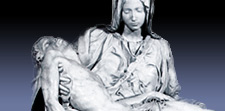God's Answer to Human Suffering
 The problem of pain and suffering is one of the toughest, not just for the Christian worldview, but for all worldviews. I recently stumbled on to this excellent essay by Peter Kreeft entitled:
The problem of pain and suffering is one of the toughest, not just for the Christian worldview, but for all worldviews. I recently stumbled on to this excellent essay by Peter Kreeft entitled:
What is God's Answer to Human Suffering?
I love this essay. I think this is the Biblical answer and the best answer we're going to get in any worldview system, rooted, of course, in the heart of the Gospel.
I'll give a taste that will hopefully drive you to the article, but then I'd love to hear your thoughts. . .
The answer must be someone, not just something. For the problem (suffering) is about someone (God—why does he... why doesn't he ...?) rather than just something. To question God's goodness is not just an intellectual experiment. It is rebellion or tears. It is a little child with tears in its eyes looking up at Daddy and weeping, "Why?" This is not merely the philosophers' "why?" Not only does it add the emotion of tears but also it is asked in the context of relationship. It is a question put to the Father, not a question asked in a vacuum.The hurt child needs not so much explanations as reassurances. And that is what we get: the reassurance of the Father in the person of Jesus, "he who has seen me has seen the Father" (Jn 14:9).
The answer is not just a word but the Word; not an idea but a person. Clues are abstract, persons are concrete. Clues are signs; they signify something beyond themselves, something real. Our solution cannot be a mere idea, however true, profound, or useful, because that would be only another sign, another finger, another clue—like fingers pointing to other fingers, like having faith in faith, or hope in hope, or being in love with love. A hall of mirrors.
Besides being here, he is now. Besides being concretely real in our world, he, our answer, is also in our story, our history. Our story is also his-story. The answer is not a timeless truth but a once-for-all catastrophic event, as real as the stories in today's newspapers.
It is, of course, the most familiar, the most often-told story in the world. Yet it is also the strangest, and it has never lost its strangeness, its awe, and will not even in eternity, where angels tremble to gaze at things we yawn at. And however strange, it is the only key that fits the lock of our tortured lives and needs. We needed a surgeon, and he came and reached into our wounds with bloody hands. He didn't give us a placebo or a pill or good advice. He gave us himself.
He came. He entered space and time and suffering. . .
READ the rest of the article!

3 comments:
Hey Pastor Tim! I can't get the links to work on this post. . .but I'm really interested in reading this article! Also, in response to your post above - I am SO THANKFUL (like Jane :)) that the sermons are online. My "work" (I can't believe something I love so much could be called work!)is taking me out of town for 3 weekends in a row. . .so glad I can stay caught up online!
Arijaan,
You must be the only person who was interested in reading this article! What's up with that?
I have fixed the link in the post. Here it is . . .
http://www.peterkreeft.com/topics/suffering.htm
Slowly getting caught up on blogs. That was an excellent essay. I really enjoy Peter Kreeft. I LOVED his book Socrates Meets Jesus and would recommend it to anyone.
I think he does a great job in his essay of communicating the bigness and interconnectedness of God, His Gospel, His Incarnation, and His Passion. I think we Protestants could stand to take some cues from Kreeft and other Catholic writers about the depth of these things. I remember reading varying reviews of Gibson's The Passion of the Christ and was fascinated by the beautiful imagery that a particular Catholic writer pointed out in the movie that had escaped my Protestant sensibilities. Long story short, I appreciate Kreeft's deep appreciation for the suffering of Christ and his giftedness in fleshing it out in answer to the question about God and human suffering.
Post a Comment